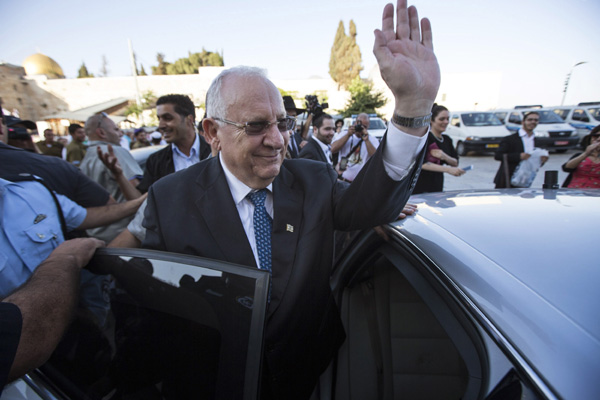 |
|
Reuven Rivlin, the newly elected Israeli president, waves to well-wishers after visiting the Western Wall, Judaism's holiest prayer site, in Jerusalem's Old City June 10, 2014. [Photo/Agencies] |
JERUSALEM - Reuven Rivlin, a right-wing legislator opposed to the creation of a Palestinian state, was elected Israel's president on Tuesday to replace the dovish Shimon Peres in the largely ceremonial post.
Rivlin, 74, is a member of Prime Minister Benjamin Netanyahu's Likud party. He has a reputation for political independence and has had a frosty personal relationship with the Israeli premier.
A former speaker of parliament, Rivlin defeated Meir Sheetrit of the moderate Hatnuah party by a vote of 63-53 in a run-off in the legislature, after none of the original five candidates won an outright victory in a first-round ballot.
Although Israeli heads of state are not directly involved in political decision-making, Peres, a Nobel Peace Prize laureate, used the presidency as a pulpit for advocating peace with the Palestinians, often taking a more conciliatory stance than Netanyahu.
Peres, 90, ends his seven-year presidential term in July.
Unlike Peres, Rivlin has called for a confederation with the Palestinians rather than negotiating an independent state for them - something Palestinian leaders have long rejected.
US-shepherded peace talks between Israel and the Palestinians seeking statehood in Israeli-occupied territories collapsed in April amid bitter mutual recrimination.
Despite his opposition to a Palestinian state, Rivlin won the endorsement of Israel's left-wing Haaretz newspaper, which noted in an editorial on the eve of the ballot that he had long advocated Jewish-Arab cooperation.
In an interview last month with The Times of Israel website, Rivlin promised that, if he became president, he would not seek to intervene in the decisions of the country's elected politicians on peacemaking or other issues.
Choking back tears at a ceremony in the Knesset after the vote, Rivlin echoed that pledge, saying: "The faith you have shown in me today, in all corners of this house, obliges me to shed, from this moment on, my political role."
